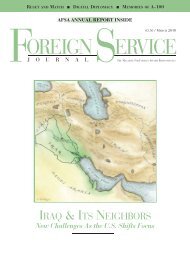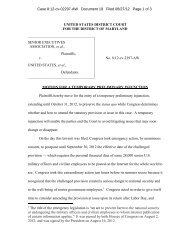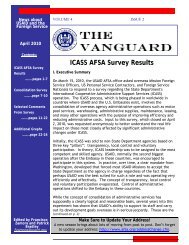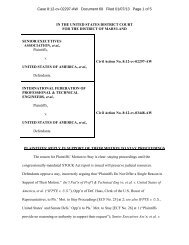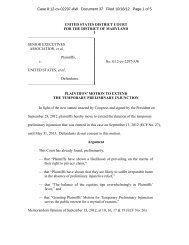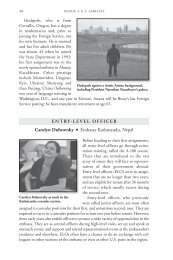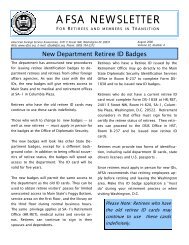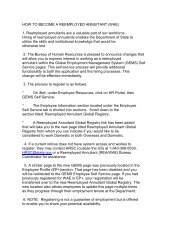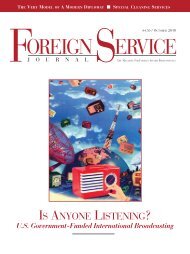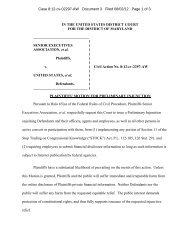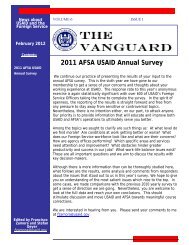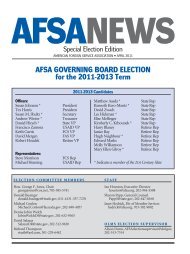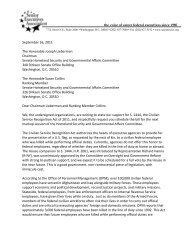F OCUS - American Foreign Service Association
F OCUS - American Foreign Service Association
F OCUS - American Foreign Service Association
You also want an ePaper? Increase the reach of your titles
YUMPU automatically turns print PDFs into web optimized ePapers that Google loves.
SPEAKING OUT<br />
Expanding Language Capacity Through Incentive Pay<br />
BY MARK ALLEN<br />
Every Information Resource<br />
Management specialist I know<br />
is pursuing information technology<br />
industry certifications or other<br />
types of continuing education. This<br />
high level of motivation to expand jobrelated<br />
skills through self-study is a direct<br />
result of the Skills Incentive Pay<br />
program.<br />
I believe that lessons learned from<br />
the success of the SIP program can be<br />
applied to the Language Incentive Pay<br />
program, which offers <strong>Foreign</strong> <strong>Service</strong><br />
employees higher earnings for proficiency<br />
in hard languages while serving<br />
in a hard-language country. With a few<br />
adjustments, LIP could become a<br />
more powerful tool for motivating employees<br />
to raise their linguistic proficiency<br />
through self-study.<br />
Elevating information technology<br />
expertise and broadening ability in<br />
languages such as Mandarin Chinese<br />
or Arabic are both important goals for<br />
the Department of State and other<br />
foreign affairs agencies. And encouraging<br />
employees to improve their skill<br />
sets through self-study without having<br />
to take them out of the work force for<br />
long-term training is even more beneficial.<br />
During my four years of duty in<br />
China, I have obtained both a Microsoft<br />
Certified Systems Engineer<br />
Certification and a 3/3 in Mandarin<br />
Chinese through a mixture of formal<br />
classroom and self-study. I earned my<br />
Enabling employees<br />
to sharpen skills<br />
without leaving the<br />
work force would be<br />
a win-win.<br />
<br />
MCSE entirely through self-study,<br />
while my language rating reflects 44<br />
weeks of training at the <strong>Foreign</strong> <strong>Service</strong><br />
Institute in Washington followed<br />
by three years of self-study. As a result<br />
of those efforts, I am currently receiving<br />
both Skills Incentive Pay and<br />
Language Incentive Pay.<br />
Over the past four years, I have<br />
been struck by the difference between<br />
the motivation levels of <strong>Foreign</strong><br />
<strong>Service</strong> employees trying to<br />
improve their Mandarin scores and<br />
IRM specialists pursuing industry certifications<br />
and continuing education.<br />
To be blunt, the amount of information<br />
technology self-study taking place<br />
among IRM specialists vastly outstrips<br />
the hard language self-study that I<br />
have observed among any group of<br />
State employees.<br />
Initially, this seemed strange to me,<br />
given the fact that language incentive<br />
pay is significantly greater than skills<br />
incentive pay. But when I examined<br />
the structure of each program more<br />
closely, the key difference between the<br />
two became clear. While SIP encourages<br />
self-study, LIP does not. In fact,<br />
in some ways the LIP program discourages<br />
individual pursuit of fluency.<br />
LIP and SIP Compared<br />
Here are some key structural differences<br />
between the two programs.<br />
Reasonable Goals: While SIP rewards<br />
are less lucrative than those of<br />
LIP, they are achievable in a shorter<br />
amount of time. (One can obtain a<br />
Microsoft Certified Systems Engineer<br />
Certification in six months or less of<br />
self-study.) LIP rewards are greater,<br />
but only attainable after extremely<br />
long periods of study. In general, a<br />
new speaker of a hard foreign language<br />
will need to spend 88 weeks of<br />
study or around 1,800 hours of class<br />
time to reach the current minimum<br />
required for incentive pay, a 3/3, in<br />
that language.<br />
Self-Study vs. State Department-<br />
Sponsored Training: Because SIP requirements<br />
cannot all easily be achieved<br />
through FSI training alone, IRM<br />
specialists are motivated to pursue<br />
them on their own. In contrast, for<br />
new speakers of a hard language, LIP<br />
rewards are almost exclusively achieved<br />
through FSI training. It is thus rare<br />
to find a new speaker of a difficult language<br />
who achieves a 3/3 through a<br />
self-directed program.<br />
Positions Linked to Ability: 3/3 lan-<br />
A P R I L 2 0 0 9 / F O R E I G N S E R V I C E J O U R N A L 13



